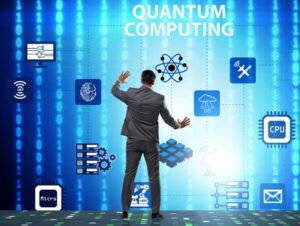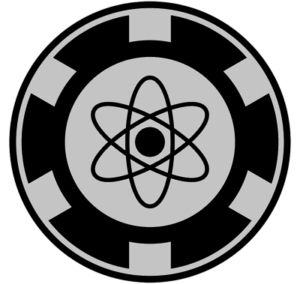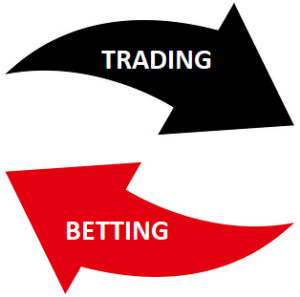 We are on the precipice of quantum computing becoming a reality. These are computers that will be able to calculate the most complex permutations that standard computers could never cope with, being able to to it quickly and efficiently. Once that becomes the case, the ability for people to use such computers to manipulate the likes of the stock market and betting markets won’t be far behind. In fact, these computing systems are so powerful that they would form their own artificial intelligence that could cut humans out of the loop entirely when it comes to betting and trading.
We are on the precipice of quantum computing becoming a reality. These are computers that will be able to calculate the most complex permutations that standard computers could never cope with, being able to to it quickly and efficiently. Once that becomes the case, the ability for people to use such computers to manipulate the likes of the stock market and betting markets won’t be far behind. In fact, these computing systems are so powerful that they would form their own artificial intelligence that could cut humans out of the loop entirely when it comes to betting and trading.
Imagine a bookmaker with no actual odds traders where everything is just done by a computer but those odds more accurately reflect the true probabilities simply because the computers are able to be so much more precise with predictions. This means lower odds margins, better value for punters, but also far less errors in the odds making spotting weak lines almost impossible.
Imagine what a quantum system could do for casino games? Here we could literally step into a virtual reality casino and play a game like roulette as if we were really in a real-world casino. You may be able to play a slot game but actually be in it, with the reels spinning all around you in a virtual world. It may even make slot games defunct as new and exciting games will be invented to take advantage of the technology.
The question, therefore, becomes about how such industries will be able to cope with this new realm of computing. Will the markets adapt and change? Will the encryption of personal information such as your address and banking details need to change? Will we soon be able to trade on things we weren’t able to before? The reality is that no one is quite sure what the future holds, but we’ve taken a look.
What Is Quantum Computing?
 First things first, what exactly is quantum computing? At the time of writing, the likes of Microsoft, Google and IBM are going head-to-head with each other in order to become the first company to create a quantum computer that will genuinely be useful. It is an industry that could genuinely revolutionise the world, not just in terms of communications and the ability to break encryption but also in the development of artificial intelligence.
First things first, what exactly is quantum computing? At the time of writing, the likes of Microsoft, Google and IBM are going head-to-head with each other in order to become the first company to create a quantum computer that will genuinely be useful. It is an industry that could genuinely revolutionise the world, not just in terms of communications and the ability to break encryption but also in the development of artificial intelligence.
In order to successfully explain a quantum computer we first have to understand traditional computers. Normal computers, such as the one you’re most probably reading this piece on, have a memory and processing system that use bits. These are effectively akin to minuscule switches that can be either on or off. If it is on then it is represented by the number one, whilst off is represented by the number zero.
Whether you use apps on your mobile phone, visit websites or take photographs, each action is a series of zeroes and ones. The advancement of technology means that it is clear that such computing works for the majority of things, but what modern computers don’t do is accurately reflect the way the world actual works. Things are typically uncertain in nature, rarely either on or off.
The issue is that even the greatest computers ever created aren’t good at dealing with uncertainty, which is what we find most of the time in nature. Physicists have spent a century working on what happens when things are reduced to their smallest scale, inventing a new field of science that is known as quantum mechanics. They need to better understand this world, which is why quantum computers are so important.
They use qubits instead of bits, meaning that they can be on, off or in what is known as the ‘superposition’. This essentially means that they’re somewhere between on and off at the same time. Qubits allow quantum computers to work in the world of uncertainty, which is part of what makes them so powerful. The thing that makes it even more fascinating is that physicists still don’t understand exactly how quantum computers work.
You don’t need to understand something to use it though, most breakthroughs are empirical, i.e. we use something because it works not necessarily because we understand how it works. Think of most things in medicine (vaccines, antibiotics, etc.), most of these were discovered long before it was understood how they actually work.
What Quantum Computers Will Be Able To Do
 Part of the reason for the excitement around quantum computers is that their ability to operate in the world of uncertainty means that they will be able to quickly work out problems that traditional computers would take millions of years to come up with a solution to.
Part of the reason for the excitement around quantum computers is that their ability to operate in the world of uncertainty means that they will be able to quickly work out problems that traditional computers would take millions of years to come up with a solution to.
Imagine finding yourself trapped in a maze; if you were a traditional computer you would need to investigate all paths one by one. Quantum computers, on the other hand, can look at all paths at the same time and find the exit in a fraction of a second.
Quantum computers will give us the ability to do things that even the work’s best supercomputers can’t currently do, including rapidly developing the world of artificial intelligence. At the time of writing, Google is using them in order to improve the software that the company uses in self-driving cars. Any large, complicated system that is currently in existence will find a use for quantum computers.
Powerful But Unreliable
 As things stand, quantum computers are incredibly powerful but extremely unreliable. Even the smallest thing can knock a qubit off its course and interfere with what it is working on.
As things stand, quantum computers are incredibly powerful but extremely unreliable. Even the smallest thing can knock a qubit off its course and interfere with what it is working on.
Currently, the most powerful quantum computers have around 50 qubits in them, but they have to be kept in temperatures of absolute zero and free from interference from the likes of electricity and heat.
This means that the current iterations of quantum computers suffer from a high error rate in their work.
The biggest breaks that have been enjoyed so far have come in controlled settings, so we’re still years away from them being useful and probably lifetimes away from getting to the point when quantum computers will be mass produced and readily available for everyone to get their hands on.
Why Quantum Computing Could Change Betting
 Most of the games and slots that you play online are controlled by Random Number Generators. These RNGs simulate randomness as best they can, without actually being 100% random in their output. There are humans that work at creating odds for sportsbooks, but they are supported by computer algorithms that make the work much easier for them and help to supply odds and markets.
Most of the games and slots that you play online are controlled by Random Number Generators. These RNGs simulate randomness as best they can, without actually being 100% random in their output. There are humans that work at creating odds for sportsbooks, but they are supported by computer algorithms that make the work much easier for them and help to supply odds and markets.
In short, there is very little that you can engage with in the world of gambling that isn’t influenced by computers in some way, shape or form. This includes the digital security that is in place to protect your personal information and ensure the safety of betting sites. Whether it be your bank details or where you live, any information that you input into online betting accounts is encrypted using high-level technology.
It goes without saying that the problem with modern computers is that are not as quick as their quantum counterparts. This means that it could get to the point where controlling the flow of information is impossible using traditional computers. Instead, quantum computers will be able to break down the walls of encryption keeping your information safe, as well as the Random Number Generators used for online casino games.
Imagine a world in which a quantum computer is able to predict what an RNG is going to ‘randomly’ issue users in a game of Texas Hold’em Poker, or can successfully figure out your bank details despite them being encrypted. It would mean that the very idea of fairness, on which the entire online gambling industry is predicated, wouldn’t be valid. RNGs cannot currently be hacked or exploited, so that falls down the second that they can be.
It’s not just negative, of course. There’s no reason why it wouldn’t be the online casinos themselves using quantum computers, which would allow them to offer even more protection to your personal details as well as to ensure that the games that you play truly are random. Equally, quantum computing could be used to protect your money, meaning that hackers would literally never be able to get hold of it.
The introduction of quantum computing to the world of gambling would change absolutely everything. It wouldn’t just be the manner in which games are run that would be different but even the very nature of the games that we play online. Unique visuals, intelligent responses, online poker in which the computer knows every possible combination of cards you could have and knows the odds. Everything would be different.
Crunching The Numbers
![]() Quantum computers will not only allow bookmakers to crunch the numbers on their calculations of odds but also be used by bettors to take the bookies on at their own game. Yes, the likes of In-Play betting and odds can be used to improve the user experience, but quantum computers might also allow punters to predict the winners of games by looking at previous results in a matter of moments, rather than years.
Quantum computers will not only allow bookmakers to crunch the numbers on their calculations of odds but also be used by bettors to take the bookies on at their own game. Yes, the likes of In-Play betting and odds can be used to improve the user experience, but quantum computers might also allow punters to predict the winners of games by looking at previous results in a matter of moments, rather than years.
It’s important to realise that even quantum computers will get things wrong every now and then. A look back at the data from the 2018-2019 and 2019-2020 seasons wouldn’t have allowed anyone to predict the appalling season that Liverpool Football Club endured in the Premier League in 2020-2021, for example. No amount of statistical analysis would have predicted Jordan Pickford nearly breaking Virgil van Dijk’s leg, leading to the Dutchman missing most of the campaign.
Plenty of people using quantum computers may well have bet on the Merseyside club to win the league again in 2021, or least finish in the top four. Errors, therefore, will still be possible and no amount of quantum computer usage will put paid to the betting industry. That being said, the odds are likely to be fairer and certain aspects, such as matched betting, might be much harder for punters to engage in once they’re in use.
What About The World Of Trading?
 Knowing how quantum computers might have an impact on the betting market is one thing, but what about the world of financial trading? There are many that would equate the stock market to gambling, but that comparison is wide of the mark. Yes, you risk money when you’re making trades but it’s only those that enter into the market having done no research and simply randomly picking trades that are essentially gambling.
Knowing how quantum computers might have an impact on the betting market is one thing, but what about the world of financial trading? There are many that would equate the stock market to gambling, but that comparison is wide of the mark. Yes, you risk money when you’re making trades but it’s only those that enter into the market having done no research and simply randomly picking trades that are essentially gambling.
Indeed, in the modern era, most trades aren’t even carried out by human beings but are instead done by algorithms. Computers keep track of the market, identify trades to make and do the necessary calculations in moments. Hundreds, if not thousands, of trades can be done in a moment, so what should be bought or sold is decided by a computer rather than a real person, making it far more reliable.
If that is the case at present with normal computers, imagine how much more accurate such trades would be if the calculations were being done by quantum computers instead? It might well end up in a point where the market is more stable because decisions made by fear rather than judgement are much less common. The need to use a human’s intuition will have been removed from the process altogether.
The modern stock portfolio is, in essence, based on the optimisation of processes. Quantum computers are able to operate at such an optimised rate that one could, in theory at least, process all of Wall Street financial models at once. If one could create a feasible model that allows it to find a portfolio that maximises its expected return up against a given level of risk then that might well prove to be the ball game.
Modern computers are able to get close to this by using approximations, but quantum computers could go one step further. If it happens, it would be a paradigm shift in the world of trading that would allow those with access to such a computer to make unparalleled amounts of money. It would change the face of the stock market forever, which wouldn’t necessarily be a good thing.
It Is Still Some Way Off
 Regardless of the process in question, powerful computers that can work things out in a moment would completely alter how data is dealt with. Given the extent to which the modern world is so data-led, it might well mean everything from banking to sports betting changing as we know it. The fact that normal people will not be able to access the services of quantum computers may well result in a further shift to the dynamic of life.
Regardless of the process in question, powerful computers that can work things out in a moment would completely alter how data is dealt with. Given the extent to which the modern world is so data-led, it might well mean everything from banking to sports betting changing as we know it. The fact that normal people will not be able to access the services of quantum computers may well result in a further shift to the dynamic of life.
Many people believe we already live in a world of the haves and the have-nots, but that would develop to be the ‘have access to quantum computers’ versus the ‘do not haves’. It’s no surprise that private funds are pouring money into the world of quantum computing, knowing that the return that they’ll get on their investment could be astronomical. Between 2012 and 2019, private investors had funded more than 52 quantum-technology companies for that very reason.
Whether you see it as good news or bad news, the reality is that quantum computing is still some way away from becoming an every day reality. Yes, quantum computers already exist and are being used by companies to try to solve the problem of making them more commonplace. Yet that is a solution that hasn’t been found and it is unlikely it will be anytime soon. For now, the old fashioned battle between punter and booker will remain king.